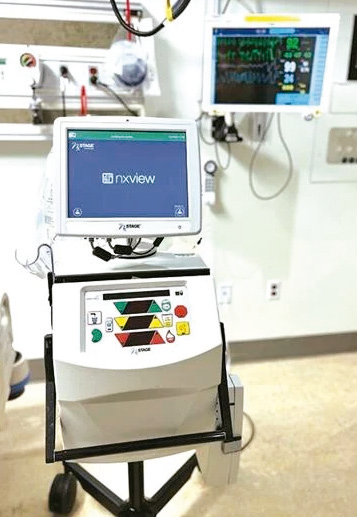
Cheshire Medical Center in Keene recently added two continuous renal replacement therapy (CRRT) machines, like the one seen here, to treat kidney failure in ICU patients. (Courtesy photo) Two weeks ago, Cheshire Medical Center reported half of its 10 intensive care unit patients were experiencing kidney failure.
This is a common complication for critically ill patients, usually caused by an interruption in blood flow to the kidney, such as when someone experiences cardiac arrest or septic shock from a bloodstream infection.
Patients experiencing kidney failure will often need some form of dialysis to treat it.
Traditional dialysis involves pulling liters of blood from the patient to remove extra fluids or waste from their blood, just like a functioning kidney would.
But for many ICU patients, this treatment is too taxing on their bodies, according to Dr. Robert Westlake, medical director of Cheshire Medical’s ICU.
“We’d often try to dialyze a patient in traditional ways so we wouldn’t have to move them (to a different hospital), but more than 50% of the time, it just didn’t work and we’ve have to move them in the end,” he said.
To address this problem, the Dartmouth Health affiliate recently began offering a new form of kidney failure treatment geared toward very ill patients.
Continuous renal replacement therapy (CRRT) is used for 24 hours or longer — compared to a few hours with normal dialysis — through a continuous, slower process which takes much less blood from the patient at once.
Cheshire Medical purchased two CRRT machines for $23,500 each last summer with money from its capital expense budget, the hospital said.
Cheshire Medical began using the treatment in August, following training with the nephrology department at Dartmouth Hitchcock Medical Center in Lebanon, according to a news release from the hospital.
Patients in unstable condition tolerate CRRT better than traditional dialysis, Westlake said, and having this option locally prevents patients from being transferred out of the region for care.
“A lot of patients are in the ICU two weeks sometimes,” he said. “Think about that for their families — instead of having to drive up to Lebanon to see their loved one ... they can do it in Keene.”
Alongside the new treatment, patients in Cheshire Medical’s ICU can receive telehealth care from specialists at Dartmouth-Hitchcock Medical Center, the release notes.
About 60% of ICU patients worldwide develop acute kidney injury, a type of kidney failure, according to the release.
And the rate of patients developing acute kidney injury requiring CRRT has increased by 10% each year over the past 20 years, the release notes.
Cheshire Medical has treated between 10 and 20 patients with CRRT since it began offering it, according to Westlake.
Due to demand, he said it’s likely the hospital will need to buy more machines to double its supply.
He added that in some cases, CRRT devices can also be used to maintain the function of vital organs for donation when an ICU patient dies.
Ultimately, Westlake said this program will save lives and improve patient outcomes “like never before.”
“Having an option for the sickest of patients right here in southwest New Hampshire,” he said, “is just a tremendous benefit for the community.”
— OLIVIA BELANGER/KEENE SENTINEL